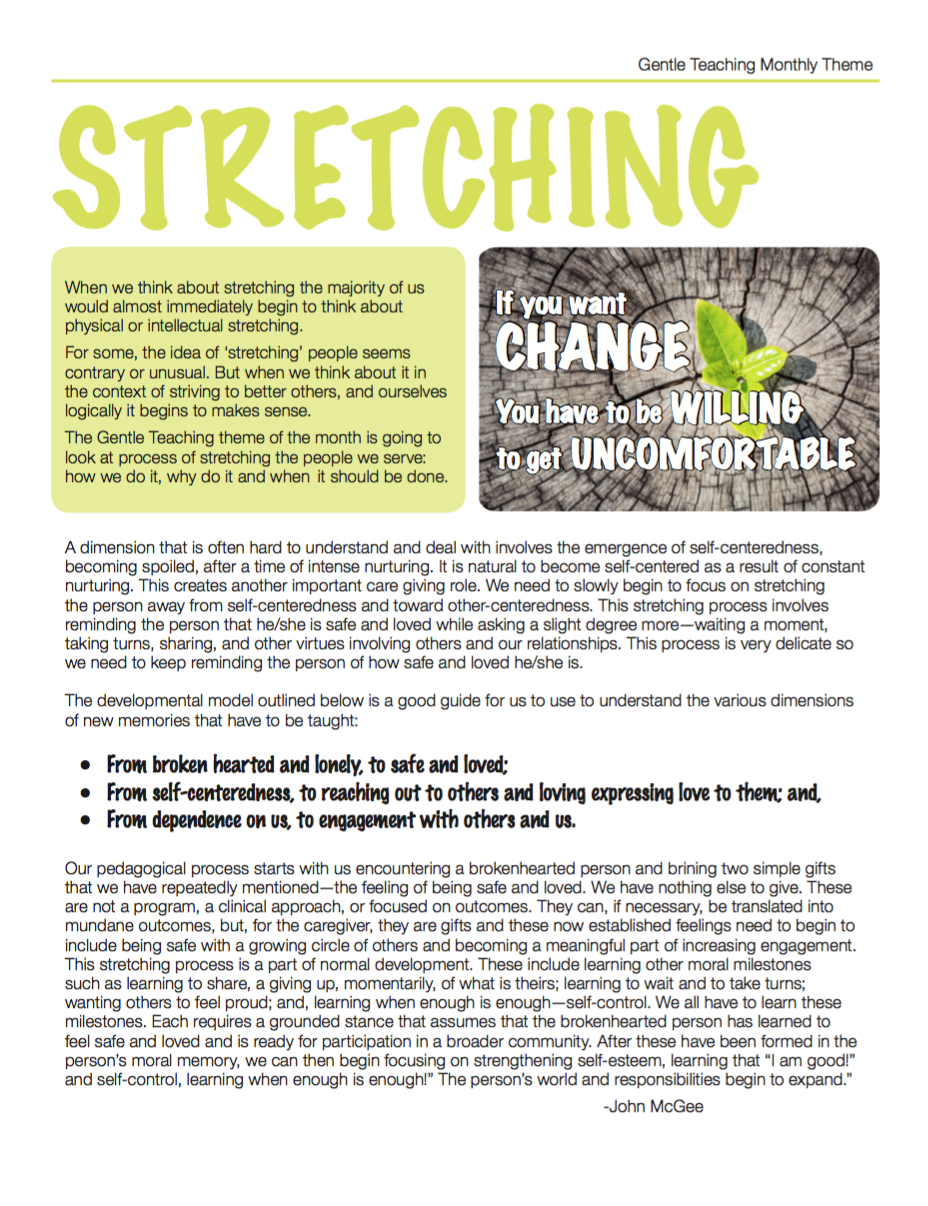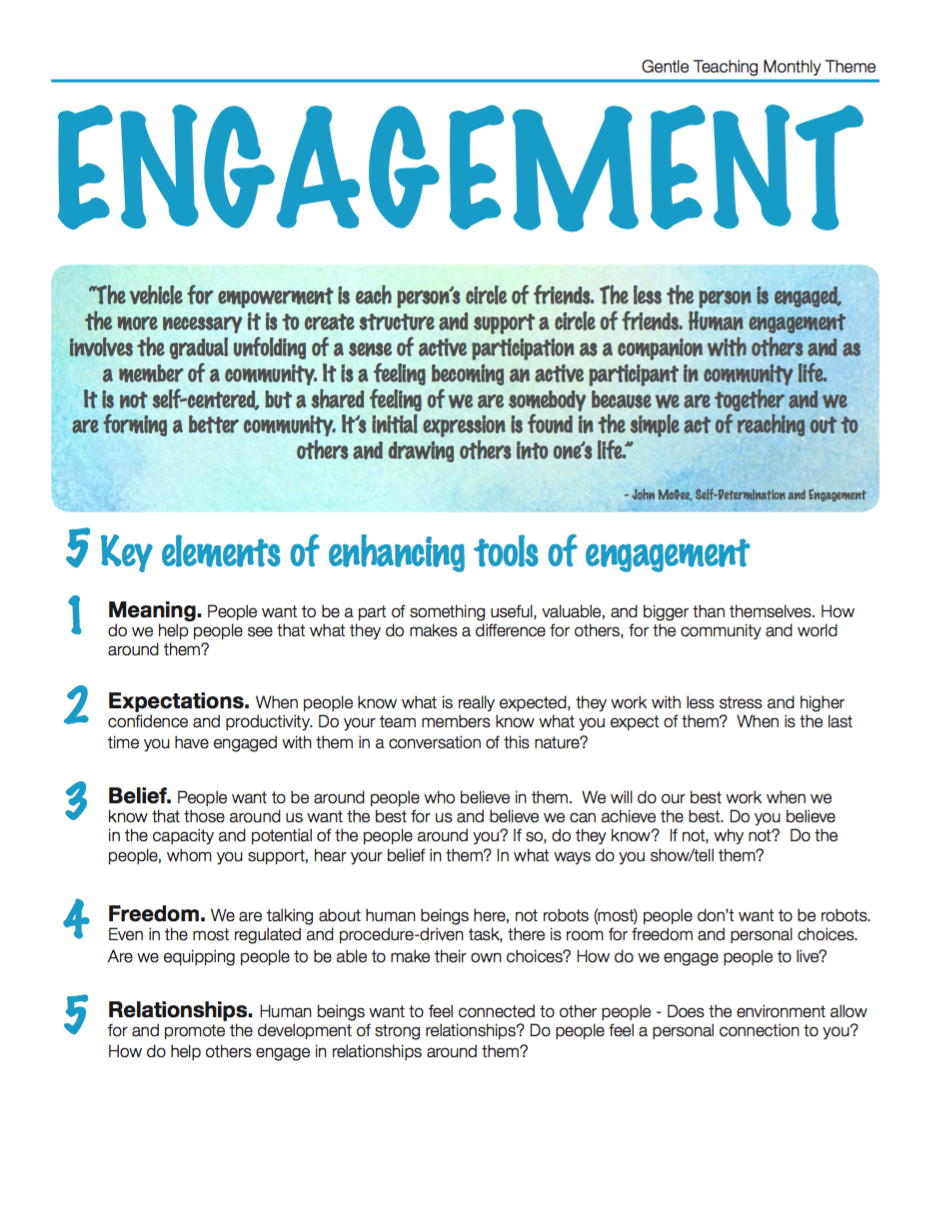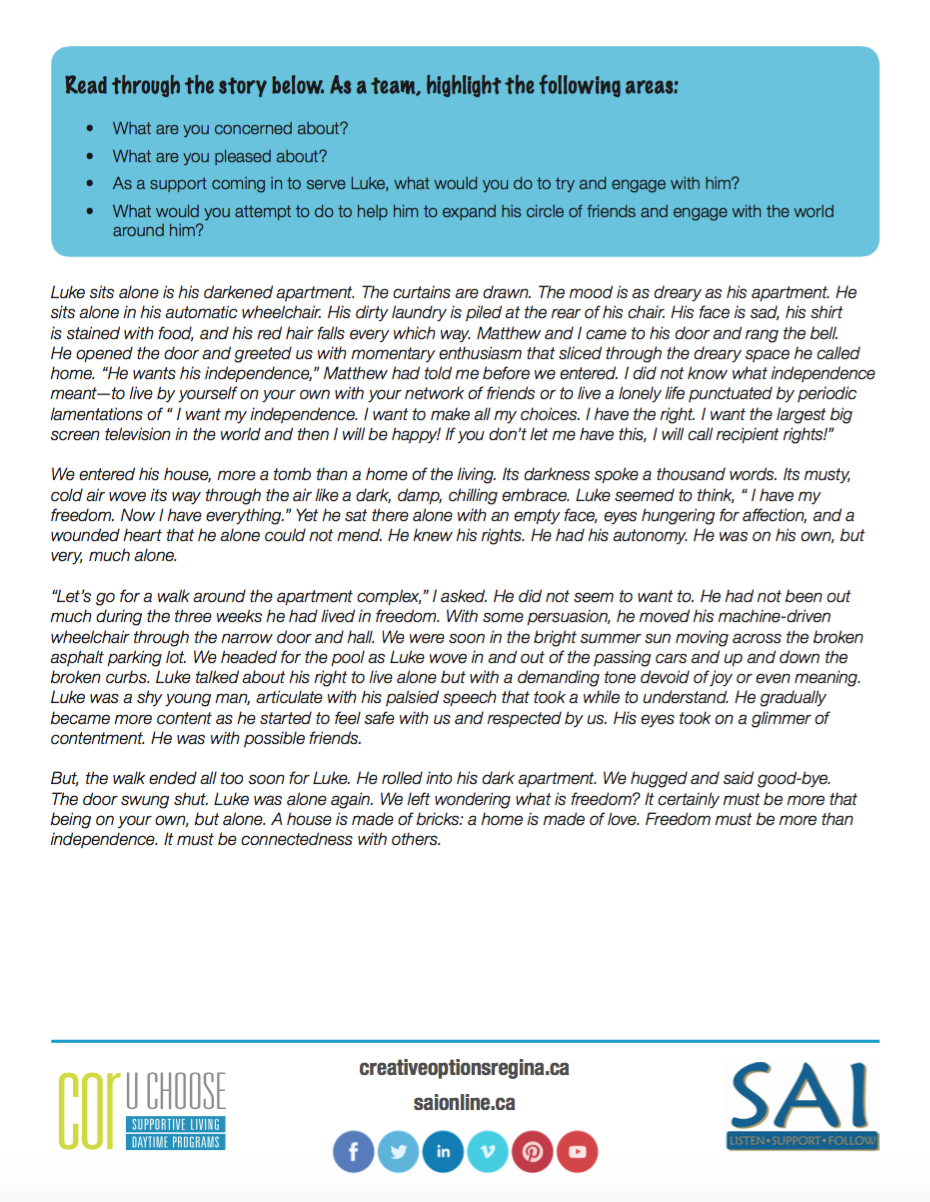Teaching Feelings of Safety and Security
/in Blog, Gentle Teaching, Stories/by Michael“If we want to teach feelings of safety and security, we need to question what we are doing and how we are doing it. The key is to look at ourselves and ask, ‘ What do we represent to the person–love or domination?’ If we see the person as our equal and if we define our relationship as one of brotherhood and sisterhood, then the answer becomes more obvious. We commit ourselves to making certain that our presence signifies feelings of safety and security. Yet, we need to deal with the irony of representing these feelings while face to face with rejection, disruption, or even violence.
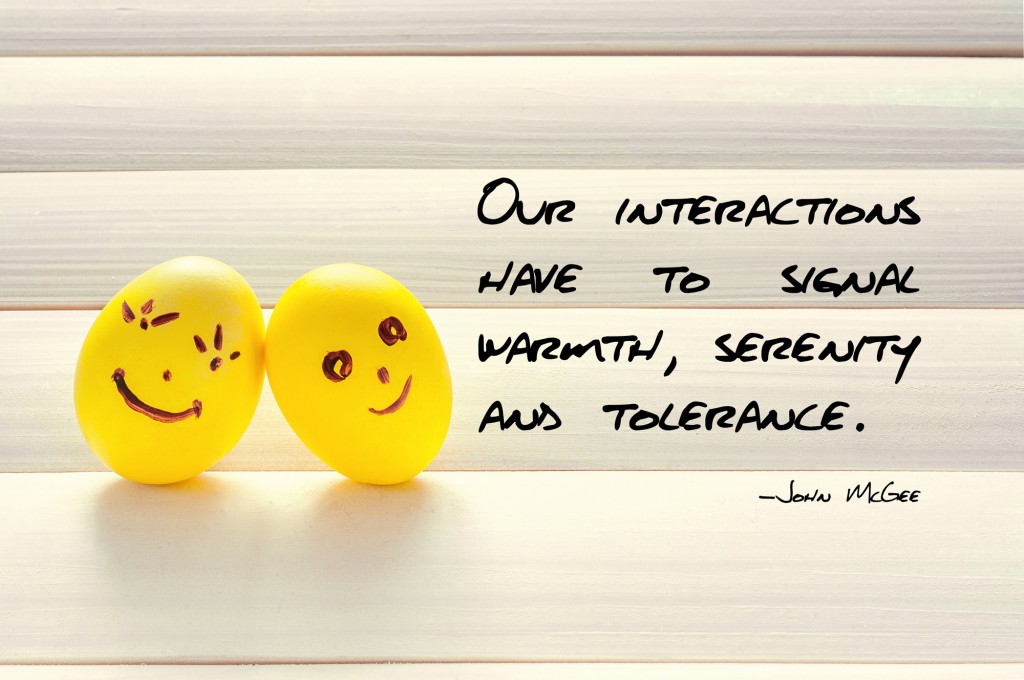
Our interactions have to signal warmth, serenity and tolerance. From the first instance, we need to make sure that the person interprets our presence as representing nonviolence. Warmth emanates from a strong desire to be one-with-the other. We have to put in check many customary reactions–demands, harshness, and objectivity. Care giving is a very personal process that needs to summon forth feelings of friendship. At first, we should not expect acceptance since all of the person’s history says control is the rule. But, in time, the person will begin to see us as representing safety and security.”
-John McGee
Our Approach is Based on Moral Development
/in Blog, Gentle Teaching/by Michael“Our approach is based on moral development. This is not a church thing. It is an internal feeling that we develop over time about what is good, who we are, and why we are on this earth. It is an inner change, a change of the heart. It is what most children learn early in their life about feeling safe and loved. It is what many of us have to re-learn when we are crushed by life’s sorrows.
So, we have to develop an understanding of basic moral values and teach these in an authoritative manner, not coming down on the person, but patiently and repeatedly teaching them. Morality is the way we feel and view our role in life. It is made up of our basic beliefs that are learned through our own life-experiences and ongoing reflection on our place in the world. It is formed deep down in our memories over time and with many experiences. Morality is on the fringe of our consciousness. We often do not have to stop and think, “Should I do this or not do that?” Our life-decisions come out of deep, deep memories. A spirit of gentleness focuses on teaching deep moral memories to people whose hearts are broken. Our primary strategy is repeated acts of love.
The first moral rule is found in a feeling of companionship– safe, loved, loving, and engaged. We know, without even thinking about it, that we need to feel safe and loved on this earth. We gravitate toward those who fulfill this sense and move away from those who make us fearful. Yet, many people whom we support are filled with fear of themselves and of others. We look for meaning in our lives and find it in our relationships with others other family, our children, our friends. Many whom we serve do not have this type of meaning.
The second is found in community– the goodness of being with others, engagement with others, and reaching out to others, and a sense of connectedness with others. It is a feeling of being collectively safe, loved, loving, and engaged. It moves from a singular relationship with the caregiver to a collective relationship with a circle of friends.
Companionship and community occur in a spiral. The initial relationship is at the center, but slowly spins outward to others. Everyone needs the feeling of being safe and loved to also feel loving and engaged. This evolves with one person, then two, then many.”
-John McGee, ‘Mending Broken Hearts’
Mentoring a Spirit of Gentleness
/in Blog, Gentle Teaching, Stories/by Michael“Mentoring is a way to help teach others about gentle care giving, to enter into terrifying spaces and teach others to feel safe and loved.” Mentoring is an approach to do this. It is a way to share with others a spirit of gentleness and justice.
A mentors role is to define the empty and sometimes violent spaces that exist between caregivers and marginalized individuals in institutions, shelters, homes, prisons, nursing homes, schools and wherever we happen to serve. These places have to be filled up with the caregivers’ laces of affection–their loving touch, warm words, and kind gazes. Caregivers need to stop and reflect on the formation of companionship and community and the role of helping individuals feel safe, engaged, loved and loving. From this foundation, caregivers can then create communities of caring. Mentoring is a process for teaching caregivers to establish companionship and community.
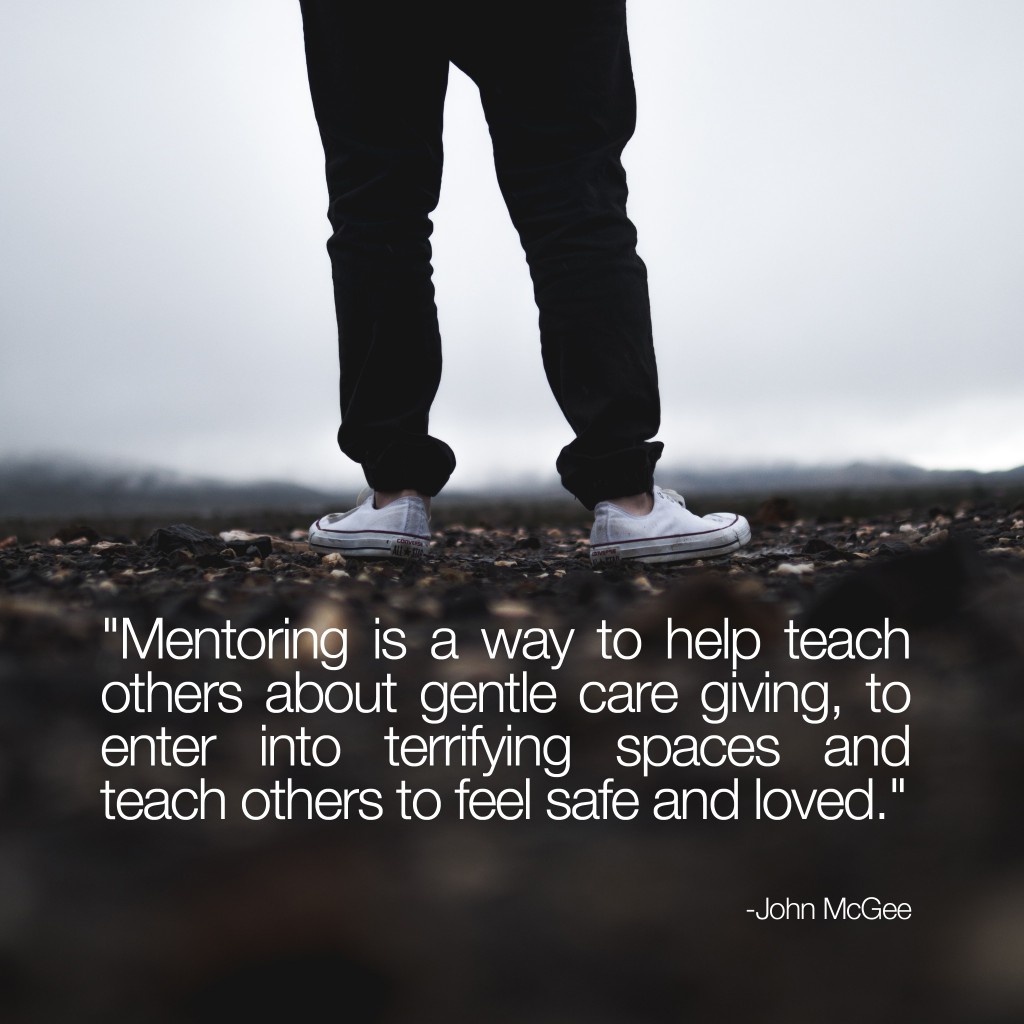
Mentoring is an ever-deepening task that calls for the development of trust among caregivers and the formation of a sense of companionship and community. This trust starts by the Mentor entering into the caregivers’ space with a deep sense of humility and justice and helping each caregiver feel safe and respected. It is the informal coming together of the Mentor and caregiver around the kitchen table and the sharing of the meaning of companionship and community. It is working together and finding ways to teach marginalized people these feelings.”
-John McGee
Psychology of Interdependence
/in Blog, Gentle Teaching, Stories/by Michael“Regardless of the type of aggression, self-injury or withdrawal, we assume that a hunger for being-with-others rests in the human spirit, longs to be fulfilled, and , in many instances, needs to be uncovered. We struggle to uncover and fulfill this need in ourselves and others. We are often pushed by the fear of giving ourselves to others and pulled by the hope that such feeling give rise to. Our fear can lead us to lord over others in order to gain a false sense of power. But, the more we question our values, our hope can lead us to feelings of companionship. This pushing and pulling leaves us in a quandary–to reach out toward others or to preside over them. The desire to affirm the other is often buried in us by years of training that have taught us that independence is the central goal of life, and, for those who are on the fringes of community, compliance is the pathway to success.
Yet, self-reliance and blind obedience are lonely conditions that lock us and others out of the embrace of human warmth and affection. Those who are committed to care giving often do not recognize this struggle within themselves, let alone in the marginalized people whom they serve, So the first place to start in the psychology of interdependence is with ourselves, our values, and how we translate these into reality.”
John McGee
Authenticating Life
/in Blog, Stories/by MichaelPerhaps you are like me and occasionally enjoy looking at at a piece of art. Whether it is the color, systematic brush strokes and blending or perhaps it is the stylistic nature of the painting. To me art speaks volumes. I love admiring, analyzing and relishing in the beauty of the canvas–for some, admiration isn’t enough.
In 1996, Britain “Ripper” (not Jack the Ripper) emerged from the smoke as the world’s greatest art thief. It was soon found out that the ‘Ripper’ had been a local gardener and golf course keeper whose name was Mr. Bellwood. The first time this man was arrested, the police officers stormed his house to find a typical British dwelling; His wife Susan and their daughter were sitting in their living room having a cup of tea. At first the police feared they had the wrong man as Bellwood’s house had the appearance of being a middle-class home; it wasn’t until they began tearing down Mr. Bellwood’s walls that they found hidden away a gallery consisting of nearly 1,000 pieces of world history and art dating back to the 15th and 16th century. For obvious reasons he was arrested; but was released a mere two and a half years later on having good behavior. Since his release Bellwood has continued his thievery, taking into his possession over one-hundred-million pounds worth of history artifacts and art. It is now suggested that Mr. Bellwood has fled from England and is living overseas and working in the art world.
As soon art began to go missing, duplicates began to appear–however they were falsified documents and had to be authenticated. I don’t know about you, but authenticating something doesn’t sound like and easy job: it takes time, meticulous effort and observation.
When something is authenticated it is deemed, true, genuine, and ‘original to design and purpose’. While some people may heartily disagree with me, I suggest that authenticity in our world is an uncommon trait. Just like Mr. Bellwood, we as people so often portray ourselves as something that we are not or because of our historical pasts, feel unable to live authentically; but this is what our world needs! When you wake up in the morning, and leave your house people should be able to look at your life and be astonished by the courage and boldness that you have to live as you are. This doesn’t mean that we don’t learn from each other: in fact I am convinced that a life that stops learning is a life that stops living — similarly if we can’t live authentically before those who encompass our daily lives, I would ask if we are then truly living.
Authenticity flows beyond ourselves and into our family lives, our relationships and into our places of work. For those who choose to strive to live authentically it fosters a community that births life: a safe place where people are challenged, supported and offered an invitation into true relationship. This needs to become our new status quo. As I sign-off for now I leave you with a snippet from John McGee, who encourages us to live authentically before the people we serve: allowing our own story and personality to penetrate our own hearts and the hearts of those we serve.
“Unconditional love has to be expressed in our very being. Our presence has to evoke a peace like a single glimpse of the sun does in the midst of a storm. Our touch, words, and eyes have to be like a gentle breeze that calms the storm of fear and meaninglessness that is always lingering on the horizon. We must be authentic. How we use these has to reflect our own life-story and personality.” – John McGee
Ben Raine,
Director of Culture and Mentorship
Reverse Effects
/in Blog, Gentle Teaching/by Michael“We keep trying to establish feelings of companionship and forming community among those who are marginalized. Yet, we struggle to create a sense of connectedness in a culture that demands independence and self-reliance. We listen to newscasts that announce this. We hear newscasts tell us the strong must control the weak. We read newspaper stories that trumpet the glory of the self. These cultural attitudes become part of our care giving. We have been trained to seek compliance and control. We demand that those whom we serve choose what is right and good when they do not trust us, in fact, often fear us. We live in a world that places the individual above the community.
As care givers, we have to reverse this trend and begin to question what the other needs — to feel safe with us and loved by us. A psychology of interdependence assumes that we find ourselves in others and in the strength of our connectedness to others. It is the foundation of who we are and what we are becoming. It leads us to develop a sense of companionship with those who distance themselves from us. We have to move from a culture of self-reliance to one of human connectedness and from a culture of self to one of otherness. As we do this, we are slowly moving toward the formation of community where we will feel collectively safe, loved, loving and engaged.
Interdependence is based on our shared values — the wholeness and inherent goodness of each person in spite of violent behavior and the thirst that we all have for a feeling of being one-with-one-another in spite of paradoxical behaviors that push others away. These values are difficult to maintain, but are necessary if we are to help those who cling onto the slippery edge of family and community life.”
John McGee,
Mending Broken Hearts: Companionship and Community
4to40 featured in Saskatchewan Chamber of Commerce Newsletter
/in 4to40, Blog, Employment, Stories/by jephWell 4to40 is at it again! This time it was the Saskatchewan Chamber of Commerce writing about the impact the program is having at the University.
To download the Saskatchewan Chamber Newsletter, click here –> Jan 2015 Edition
Finding Value in My Day – March 4th & 5th, 2015
/in Blog, Events/by jeph
COR is pleased to we welcoming the return of Cara Milne to Regina to host two, one-day workshops on Finding Value in My Day! For more information, contact the COR office.

